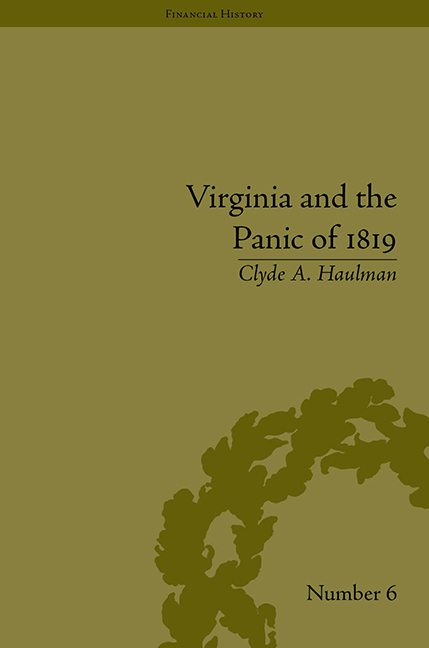Book contents
6 - Poor Relief
Summary
With the onset of the Panic of 1819, Virginia found itself in the midst of substantial financial volatility combined with the much more significant loss of foreign markets for the state's agricultural staples. It was the latter that sent prices plummeting and stalled the Commonwealth's economy. Deflation coupled with debt created during the expansion following the end of the War of 1812 created a sharp decrease in business activity, falling property values and a general gloom across the Commonwealth. As a result, some Virginians looking for reasons behind the state's diminished prosperity blamed the people. For example, Governor James Preston in his letter to the General Assembly at the beginning of the 1819–20 session suggested that ‘we have rushed upon our own ruin’ as a result of our ‘love of ease and extravagance, and inordinate desire to grow suddenly rich’. Further, we have ‘thoughtlessly and imprudently … availed ourselves of the facilities heretofore demanded as indispensable for our national advancement’. Yet, according to Preston, ‘we can neither be ignorant of the causes, nor of the proper remedies to relieve us from the consequent embarrassments’. For the Governor the remedies were to ‘unite in our efforts to return to our habits of industry and oeconomy’.
However, urging renewal of the old ways of industry and suggesting individuals practise ‘oeconomy’ did little to help those made destitute by the depression. Instead of pointing a finger at people and urging them to improve their lot, others in the Commonwealth seemed willing, at least initially, to extend a helping hand to those less fortunate. According to one scholar who has written about Virginia at the time of the Panic, in Richmond the ‘extraordinary high prices’ of food and fuel in 1816–17 led to an extra three-month allowance for distribution to outdoor paupers. In addition, as the downturn developed in 1819 and beyond, the city continued to spend 20 to 25 per cent of its budget on the poor.
- Type
- Chapter
- Information
- Virginia and the Panic of 1819The First Great Depression and the Commonwealth, pp. 103 - 136Publisher: Pickering & ChattoFirst published in: 2014

